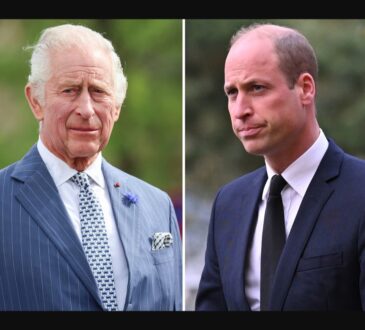
Prince Harry’s recent comments during the Invictus Games opening ceremony in Germany have sparked a wave of controversy with some feeling that he played the “race card” inappropriately.
Lady Colin Campbell, a renowned royal expert, weighed in on the matter and shared insights into how these remarks have been received in Germany.

During the ceremony in Dusseldorf, Prince Harry addressed the cheering crowd, saying, “Now, I’m not saying we play favorites in our home, but since my wife discovered that she is of Nigerian descent, it’s likely to get a little bit more competitive this year. I said, Are you ready? Let’s do this. Thank you.”
While these remarks may have been intended in a lighthearted and playful spirit, Lady Colin Campbell shed light on the fact that they have not been universally well-received, particularly in Germany.
She explained that she had received numerous reports, letters, and messages from people in Germany expressing their discomfort with the situation.
One aspect of contention in Germany has been the demands made by Prince Harry and Meghan, which led to over 2000 petitions being sent to the government.
These petitions, presumably related to the couple’s requests and actions, have stirred debate and public discourse.
However, the heart of the controversy lies in the perception that Prince Harry played the “race card.” Lady Colin Campbell, speaking on Dan Wootton Tonight on GB News, expressed her bewilderment at this choice of action, especially in Germany.
She emphasized that Meghan’s descent from Nigerian heritage has no direct relevance to which teams or nations people in Germany would support during the Invictus Games.
In her view, the connection between one’s distant ancestry and their contemporary preferences is tenuous at best.
The royal expert explained how Germany would not thank the Prince for his comments as he appeared in Dusseldorf for the Invictus Games.
Prince Harry opening the ceremony told a cheering crowd: “Now, I’m not saying we play favorites in our home, but since my wife discovered that she is of Nigerian descent, it’s likely to get a little bit more competitive this year.
“I said, Are you ready? Let’s do this. Thank you.”
In reaction, Lady Colin Campbell speaking on Dan Wootton Tonight on GB News said: “What we do not seem to understand here is that in Germany not all of this has gone down as well as is being reported in this country.
“I have got a lot reports and letters and messages from people in Germany that say that they are extremely upset about, first of all, the demands that were made by Harry and Meghan and that were action that caused over 2000 petitions to be sent to the government.
“That’s one thing. And secondly, Germany does not appreciate you playing the race card.
“Of all the countries in the world to play a race card, Harry has chosen Germany. I mean, what does Meghan’s dissent from Nigerian heritage have to do with who they would be supporting?
“I mean, I’ve never heard such rubbish in my life and I come from a multinational background. I mean, people do not support teams because they have a many times great grand grandparent who was a member of the country.
“And people in Germany don’t like it because it’s playing the race card. And there are tremendous sensitivities in Germany, not only for the Nuremberg race laws in of the 1930s, but of all sorts of issues regarding Angela Merkel and her policies with regard to immigration.”
These matters have heightened sensitivities around issues of race and identity.
While Prince Harry’s remarks may have been intended as a playful and unifying gesture, it is evident that the response has been mixed, and not everyone in Germany appreciated the invocation of Meghan’s Nigerian heritage in the context of the Invictus Games.
As this controversy unfolds, it underscores the importance of considering the cultural and historical sensitivities of different nations, especially when making statements that touch upon issues of race and identity.
What may be seen as a harmless jest in one context can take on a different and more significant meaning in another, as Prince Harry’s recent experience has demonstrated.



